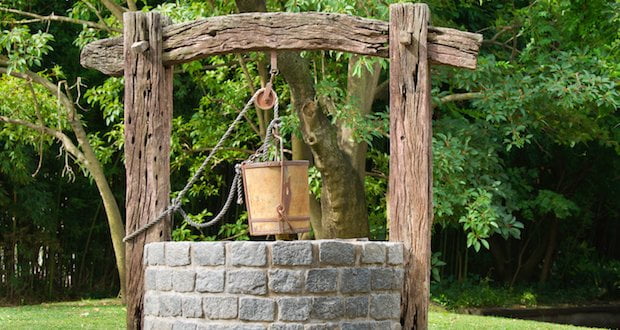Well Water Wisdom

The sun is shining and spring truly is just around the corner! People are getting the real estate itch! They are considering finally making a move to Dufferin County possibly East Luther/Grand Valley, Amaranth, Mono, Mulmur or Melancthon. They have been looking at homes for sale in all these rural areas and are excited yet nervous to finally take the plunge into country living. Some have found the perfect lot and wish to build their dream home. What are some things city folk need to be aware of when living in a rural community? One very important aspect of country living is well water. There are so many things about well water that are important, but to a home owner they are just concerned that when they turn on the tap they have plenty of water and that the water is safe. As local Dufferin Realtors® we know what important clauses we should include in an agreement of purchase and sale to ensure you are purchasing a home with quantity and quality of well water.
What is a Water Well
A well is accessing water from the underground aquifers by drilling, digging, boring or some other way to get to the ground water. Many older wells were just dug. The land owner just dug down until they hit water. Many of these wells had a tendency to run dry in the summer months because they were not actually down in the underground aquifer. Typically new wells that are installed are drilled these days. They have drilling machines that bore down until the reach the aquifer and line the hole with a shaft made of steel to allow the water to be pumped up to the surface. Many of the drilled wells are down quite deep up to a few hundred feet. There is usually a pipe that sticks out of the ground with a cap and must be a minimum height of 16” above ground level to prevent anything from inadvertently getting down into the well.
Well Water Saftey
Well water safety has been a grave concern since the Walkerton well contamination back in May 2000 where approximately 5000 residents had been showing signs of E-coli infection and 7 people actually died from the contaminated water. Large wells that service towns have strict guidelines and testing to ensure the community is drinking safe water. What is the private well home owner need to be aware of when it comes to safety of well water? Home owners are relying that their ground source of water is not being contaminated by chemicals, farm run off or any other source of bacteria. Homeowners want to make sure their system above the well (plumping in homes) is also free from any contamination. Your local Public Health office typically offer well water testing kits. You can pick up a water sample bottle and the ministry of health with test your water for the presence of E-coli and coliform at no charge. It is a good idea to test your well water at least twice a year. Typically in the spring when there is spring thaw and run off is an ideal time to test your well.
Home owners should take precautions to help reduce the possibility of contamination by making sure the well is the correct height above ground level, has a secure cap or protected as best as it can from possible debris. Home owners can also install water treatment devices to increase protection such as UV lights and filters. Despite having these devices in your home, you should still test your water. You must also maintain these devices by changing the filters and the UV bulb as manufacturers require.
Flow
The other concern to a home owner is flow rate. You want to make sure you have enough of water to adequately supply the residents of the home. As part of an agreement of purchase we typically ask to perform a flow rate test. This is to determine how much water your well is capable of delivering on a continuous basis over a period of time. 3 gallons per minute on a continuous basis of an hour is acceptable for most wells. As local Dufferin Realtors® we are aware of some communities that tend to have wells with lower flow rates and communities that quantity of water never seems to be a concern.
Equipment
As you look at rural homes you will notice big (often) blue tanks in the basement, as well as pipes coming in from the outside wall. There may be a great big concrete structure in your yard. Wells have various components to them and depending on the type of well are often different from home to home. Experienced real estate agents will be able to explain most of the systems to you and also have professionals available to come to inspect and instruct on the use of the components of the water/well system.
If you are thinking of making the jump to country living and want to make sure your family’s water needs are protected, it is recommended to make sure your Real Estate agent is very proficient in well water quantity and quality. To learn the hard way can be very costly to your wallet but more importantly to your family’s health.

